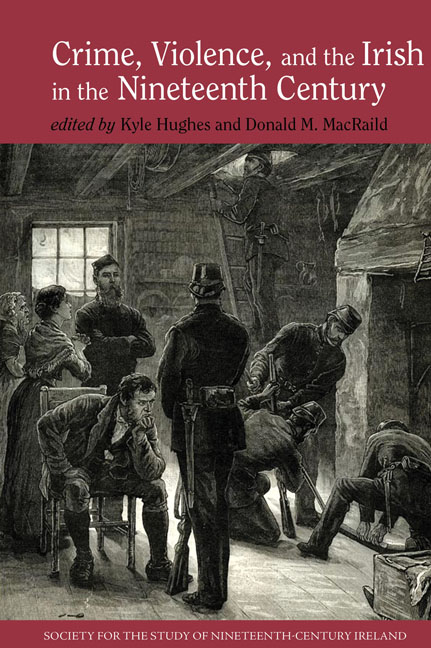Book contents
- Frontmatter
- Contents
- List of Illustrations
- List of Contributors
- Introduction: Crime, Violence, and the Irish in the Nineteenth Century; Themes and Perspectives
- Section 1 ‘Secret Societies’ and Collective Violence
- 1 Whiteboys and Ribbonmen: What's in a Name?
- 2 The Law of Captain Rock
- 3 ‘Night Marauders’ and ‘Deluded Wretches’: Public Discourses on Ribbonism in Pre-Famine Ireland
- 4 Organised Labour in Limerick City, 1819–1821: Violence and the Struggle for Legitimacy
- Section 2 The Law and its Responses
- Section 3 Sectarianism and Violence
- Section 4 Manifestations of Crime and Violence
- Index
3 - ‘Night Marauders’ and ‘Deluded Wretches’: Public Discourses on Ribbonism in Pre-Famine Ireland
from Section 1 - ‘Secret Societies’ and Collective Violence
- Frontmatter
- Contents
- List of Illustrations
- List of Contributors
- Introduction: Crime, Violence, and the Irish in the Nineteenth Century; Themes and Perspectives
- Section 1 ‘Secret Societies’ and Collective Violence
- 1 Whiteboys and Ribbonmen: What's in a Name?
- 2 The Law of Captain Rock
- 3 ‘Night Marauders’ and ‘Deluded Wretches’: Public Discourses on Ribbonism in Pre-Famine Ireland
- 4 Organised Labour in Limerick City, 1819–1821: Violence and the Struggle for Legitimacy
- Section 2 The Law and its Responses
- Section 3 Sectarianism and Violence
- Section 4 Manifestations of Crime and Violence
- Index
Summary
The trial of Richard Jones, secretary of the Friends of Irish Freedom— the Dublin-based branch of the Ribbonmen—created a great stir. His arrest in October 1839 with papers relating to the society on his person led to a series of coordinated police raids which swept up the entire leadership across several counties. Yet when the trial opened it was not the downfall of this society which caught public attention but Jones himself. Described as a respectably dressed young man ‘of intelligent appearance’ who ‘paid considerable attention to the evidence and occasionally made suggestions to his counsel’, Jones contradicted every stereotype of a Ribbonman. He had regular employment as a hay clerk in the Smithfield market, could read and write, and, as the evidence would show, had no desire to murder all the Protestants in Ireland.
The popular image of the Ribbonman as bogeyman seemed farcical when contrasted with the real person of Jones. Over the course of the early nineteenth century, public discourse had developed a particular language. Terms such as ‘night marauders’ and ‘deluded wretches’ appeared repeatedly in print along with others such as ‘banditti’, ‘country people’, and ‘midnight legislators’. This terminology carried connotations and a particular history that categorised Ribbonism as agrarian, criminal, and apolitical. While newspapers and other reports conveyed these associations in loaded terms, fictional depictions, such as those in the short stories and novels of William Carleton, developed images of the Ribbonman as bogeyman in greater detail. But these words and plotlines, and the assumptions underlying them, created misleading and distorted representations of Ribbonism. The overemphasis of the criminality and poverty of Ribbonmen in print stripped Ribbonism of its political content.
Public discourse on Ribbon societies provided the cornerstone for contemporary understandings of that organisation, its membership, and aims but also formed the foundation of our historical knowledge. Too often historians have relied on extant reports from government officials, politicians, informers, and a hostile press without taking a critical look at the words being used to describe Ribbonmen and the assumptions and implications they carried. This chapter examines common terms and epithets used in print media and argues that the repetition of language associated with poverty and crime depoliticised Ribbon societies. Moreover, the manner of this depoliticisation created explicit associations between Ribbon societies and various apolitical agrarian secret societies which have continued to influence perceptions of Ribbonmen and Ribbonism.
- Type
- Chapter
- Information
- Crime, Violence and the Irish in the Nineteenth Century , pp. 53 - 66Publisher: Liverpool University PressPrint publication year: 2017

